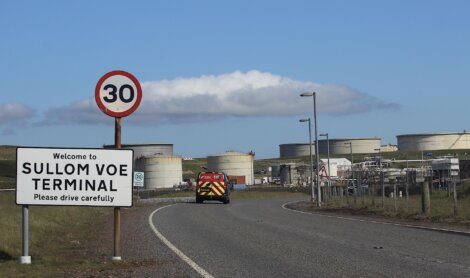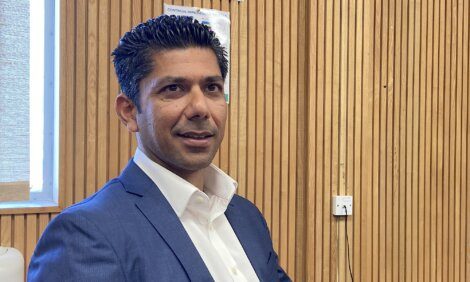Climate / Sullom Voe Terminal key in EnQuest’s bid to become a green energy leader
SULLOM Voe Terminal is set to undergo a complete rebuild over the coming years to enable the site to cater for the energy needs of the future.
Salman Malik, EnQuest’s managing director for infrastructure and new energy, said work to decommission redundant oil and gas equipment is already underway and would soon create space for the ambitious future projects of carbon capture storage (CCS) and hydrogen production.
Other opportunities are the electrification of west of Shetland oil and gas fields and, potentially, the import and storage of liquefied natural gas (LNG).
Malik has been in Shetland over the last few days, and he invited the local media to a briefing session at the terminal on Tuesday morning.
He said the company had embarked on an “orderly transition” for the terminal which will take several years.
“The game plan for Sullom Voe is not necessarily an individual project, it is about transforming the site from what used to be one of the largest oil terminals in Europe into one of the largest green energy hubs of the future,” Malik explained.
The transition process will require hundreds of millions of pounds of investment and is estimated to create nearly 200 new jobs over coming years.
He said when EnQuest took over as operator of the terminal and the Magnus pipeline system in December 2017, the company was very much focused on bringing down the cost of oil and gas production.
It was only a few years later that management realised the “true value” of the site in a rapidly changing world where decarbonisation is now the main driver of innovation.
Become a supporter of Shetland News
Right-sizing
The first steps in this transition are to “right-size” the oil and gas infrastructure and to connect the 1,000-acre site to the national electricity grid after 2025 when the terminal’s own power station will have to be switched off.
Earlier this year EnQuest started the planning process around reducing the footprint of the site to make it fit for purpose.
Plans to make Sullom Voe Terminal infrastructure ‘fit for purpose’
“We have an industrial site here with access to very unique infrastructure,” Malik said. “The deepest water port in the UK, four jetties and a 1,000-acre site which is still sized for [a throughput of] 1.5 million barrels a day.
“We are down to 100,000 barrels or less; the stabilisation unit that we have is for 400,000 barrels a day, and we only need 25,000 to 30,000 barrels a day.
“We are putting in a new stabilisation unit with gas export which is due to come online at the end of 2024 or early 2025 and will radically reduce the footprint.”
He also said that of the terminal’s 16 large oil storage tanks only four are being used.
“It is not just about fitting new projects to the site, it is about tidying up, decommissioning and right-sizing, and paving the way for bringing on new projects,” Malik added.
Carbon capture and storage
This element of the transformation is set to take two to three years to complete, giving enough time to move forward the company’s plans to store large amounts of carbon dioxide in disused North Sea oil and gas reservoirs.
Last month EnQuest secured the offer of carbon storage licences issued by the North Sea Transition Authority (NSTA), a vital step on the road to make carbon capture and storage a reality.
Seen as a major component in the drive to net zero, EnQuest says that thanks to the assets it owns in the terminal as well as the Magnus and Thistle pipeline system it is uniquely placed to import millions of tonnes of liquified CO2 from emitters in Europe and the UK and store these in reservoirs under the North Sea.
“On carbon capture with the licensing awards we are very well positioned to now start allocating significant resources and capital to get us to final investment decision (FID),” Malik said.
Green hydrogen
Turning to the production of green hydrogen Malik said he was optimistic to “have something up and running in the next five to six years” which would be initially small scale but with the potential to increase in output.
“I believe with the industrial site that we have the potential here to produce one million tonnes of green hydrogen is very real,” he said.
“Ultimately it is contingent on the availability of those volumes of electrons, but what we do know is that we can start in a phased manner – you always want to start with a phase one small project and look to build up over the next ten years or so.”
He conceded that green hydrogen is a long game and will not happen overnight.
However, with the new 600MW interconnector almost full before it is even switched on, Malik sees plenty of opportunities to attract some of the “stranded sources of electrons” to be used for hydrogen production at the terminal.
In addition, EnQuest is considering constructing a number of wind turbines on the terminal site to augment existing electricity supply.
And with interest shown by industry in developing massive floating offshore wind farms around Shetland’s coast, he is confident that over time there will be sufficient capacity for large size hydrogen production.
To produce one million tonnes of green hydrogen, wind farm capacity of about 10 Gigawatts is needed: the size of about 20 Viking Energy wind farms.
“What we are able to do here is an orderly transition. As the oil and gas flow starts to wind down, we make sure that we spend the time necessary to reskill our workforce to create the jobs of the future,” Malik said.
“There is a first mover advantage. The infrastructure here is absolutely unique, (…), here you have an industrial site with a whole host of infrastructure, the deep-water port, the jetties, a skilled workforce.”
He said by “right-sizing” the terminal the company will be able to reduce its carbon footprint by as much as 90 per cent.
Moreover, carbon capture will allow EnQuest not just to get to net zero but to become carbon negative, which means it removes more CO2 equivalent from the atmosphere than it emits.
Become a supporter of Shetland News
Shetland News is asking its many readers to consider start paying for their dose of the latest local news delivered straight to their PC, tablet or mobile phone.
Journalism comes at a price and because that price is not being paid in today’s rapidly changing media world, most publishers - national and local - struggle financially despite very healthy audience figures.
Most online publishers have started charging for access to their websites, others have chosen a different route. Shetland News currently has over 600 supporters who are all making small voluntary financial contributions. All funds go towards covering our cost and improving the service further.
Your contribution will ensure Shetland News can: -
- Bring you the headlines as they happen;
- Stay editorially independent;
- Give a voice to the community;
- Grow site traffic further;
- Research and publish more in-depth news, including more Shetland Lives features.
If you appreciate what we do and feel strongly about impartial local journalism, then please become a supporter of Shetland News by either making a single payment or monthly subscription.
Support us from as little as £3 per month – it only takes a minute to sign up. Thank you.














































































